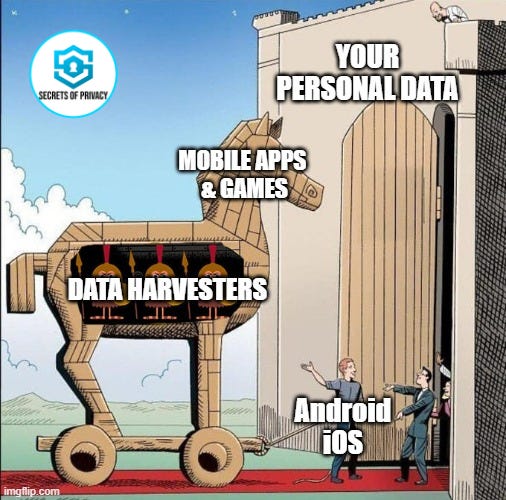The Top 20 Worst Mobile Apps for Privacy
We name the names and reveal proven tactics to minimize data harvesting
It seems like most people believe they don’t have anything to hide, so worrying about privacy on a mobile device isn’t important. Maybe they’ll eventually admit it’s a problem, but the best you can do is tweak some settings on your mobile device.
“If you’ve got nothing to hide, you’ve got nothing to fear”, is a common saying.
We disagree.
Mobile apps are giant privacy traps. And by design. Big Tech makes them highly convenient and addictive. And not for your benefit.
Apps effectively shift the privacy balance of power from you to the app provider. Think of it as a home field advantage where the provider controls the weather and bought off the referees. The goal is to harvest as much of your data as possible.
Data harvesting is even way worse than most of us imagine. Many apps, including the most popular ones out there, are busy collecting, analyzing, and sometimes selling our personal data. While data collection isn't always bad—it can improve app functionality and personalize our experiences— some apps take it to an extreme.
There are real ways to mitigate the risk. In many cases, you can continue using the underlying service but with better protections against data harvesting. How do we do that?
Not by reading privacy policies. That’s a waste of time (more on this later).
The first step is knowing which apps are the worst offenders. We have the data and reveal the worst offending apps down below.
The second step is to know the tactics and strategies that can help you defeat the data harvesting. We have the proven, insider steps you can take right now.
By knowing the worst data harvesting apps, you can decide whether to ditch the underlying service completely. Or, you can continue using the service but with our proven countermeasures to reduce or eliminate the data harvesting.
First, some quick background.
How Apps Collect and Use Your Data
We’re using the Apple App Store as the primary source here. The App Store categorizes data collection into six main purposes:
Third-Party Advertising: Apps share your data with external advertisers to serve targeted ads.
Developer Marketing: Data is used to promote other services from the same company.
Analytics: Companies analyze user behavior to improve their platforms.
Product Personalization: Data is used to tailor content and recommendations to individual users.
App Functionality: Some data is necessary for the app to work properly.
Other Purposes: Any data collection that doesn’t fit the above categories.
Apps collect data in two primary ways:
You Provide the Data Directly. The most straightforward method of collecting data is when the app user gives it to them directly. For example, you create an account and share your name, email, date of birth, zip code, etc.
The App Harvests the Data. In other instances, the app pulls the data from your device. They can do this with your permission or without your permission. We’ve all seen the pop up screens after installing an app that grants permissions and states, usually generically, what data the app collected. Typical examples here are geolocation, IP address, device type, and unique device ID #. Many apps collect more than they disclose or at least more than you would reasonably expect.
Note that privacy policies are often inaccurate or out of date. One reason is that developers regularly implement app changes without consulting with privacy SMEs and legal counsel. This is primarily a problem with smaller companies and scammy apps. Big Tech has established internal processes to limit this type of unethical behavior. But this is just one of the reasons we don’t recommend you pay attention to privacy policies. Privacy policies can provide a false sense of security and protection.
An emerging way for third parties to harvest your data is through behavioral biometrics. For now, this is a niche field of cybersecurity that analyzes your interactions with your mobile device to create a unique user profile. Effectively a highly unique digital fingerprint. For example, how fast you type, how hard you press on the screen, the angle that you hold your phone, etc. This is a personally identifying tactic already being used by some financial service providers that will almost certainly creep into other industries. We did a deep dive on this in 2024. Read it here if you’re interested.
Now let’s look at which apps are the worst offending data harvesters.
The Worst Data Harvesting Apps





